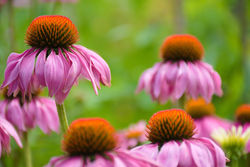4 Natural ways to eliminate lupin aphids
- Lars Wildes
- Jun 8, 2023
- 3 min read
Lupin aphids can be a frustrating challenge for lupin plant lovers like us. They cause damage and hinder the plant's growth and overall health.
While chemical insecticides are available, they can pose risks to beneficial insects and the environment.
The good news is that there are several natural and eco-friendly methods to combat these persistent aphids.
In this blog post, we’ll explore 4 easy techniques to effectively get rid of lupin aphids: soap and water, ladybugs, garlic and water spray, and companion planting with marigolds and other plants.
I need to add that these are ways to get rid of pesky lupin aphids, not prevent them from ever returning again. So keep that in mind as you choose your favorite technique and go to garden war.
Method 1: Soap and water
Soap and water is a simple yet effective method to control lupin aphids. And it’s cheap.
Mix a mild liquid soap, such as brown floor or dish soap, with water in a spray bottle.
The general ratio is 2 tablespoons to 1 liter of water — 2 tablespoons to a quarter of a gallon.
Make sure to use a mild soap to avoid harming your plants. Shake the mixture gently to combine the ingredients.
When the sun isn’t too harsh or shining directly on your plants, identify the areas of the lupin plant that are infested with aphids, particularly the undersides of leaves and stems.
Spray the soapy water directly on the aphids, ensuring thorough coverage.
The soap disrupts the aphids' protective waxy coating and dries them out.
Leave the soapy solution on the plant for a few hours to maximize its effectiveness. Afterward, rinse the plant with clean water to remove any soap residue that might harm the plant.
You might need to repeat this process a few more times.
Method 2: Ladybugs
Ladybugs are natural predators of aphids and can be an excellent ally in controlling them in your borders and gardens.
Attracting ladybugs to your garden is relatively simple. Planting nectar-rich flowers, such as daisies, fennel, and yarrow, will help draw ladybugs to your garden. These flowers provide a valuable food source for ladybugs, encouraging them to stick around and feast on the aphids.
You can also purchase ladybugs from local garden centers or reputable online suppliers.

Release the ladybugs near your lupin plants in the evening when the temperature is cooler. This timing allows them to acclimate and increases the chances of them staying in your garden.
Make sure the plants are adequately watered, as ladybugs require moisture. Repeat the release as needed to maintain a healthy population of ladybugs and ensure ongoing aphid control.
Method 3: Garlic and water spray
Garlic possesses natural insect-repelling properties that can help deter lupin aphids. Creating a garlic and water spray is an effective way to harness these properties.
Start by crushing several cloves of garlic and steeping them in water overnight.
The general ratio is one bulb of garlic per quart of water or one bulb for every ¼ liter.
After the steeping period, strain the mixture to remove the garlic pieces and pour it into a spray bottle.
Identify the areas of the lupin plant that are infested with aphids and spray the garlic-infused water directly on the plants, paying close attention to the undersides of leaves and stems.
The strong odor of garlic acts as a deterrent, helping to keep aphids away.
Reapply the spray after rainfall or every few days to maintain its effectiveness. Remember to avoid spraying during hot, sunny periods to prevent potential damage to the plants.
Method 4: Marigolds and other companion plants
Companion planting is a time-tested technique that utilizes the benefits of certain plant combinations to control pests. Marigolds are particularly effective in repelling aphids and can act as a natural barrier for your lupin plants. Plant marigolds near your lupin plants, interspersing them throughout the garden bed.

Other companion plants that can help repel aphids and attract beneficial insects include chives, mint, and nasturtiums.
These plants release aromatic compounds that repel aphids and lure beneficial insects like hoverflies and parasitic wasps, which feed on aphids. By incorporating these companion plants, you create a diverse and dynamic ecosystem that naturally keeps aphids in check.
What is your go-to method for controlling pesky aphids in your garden?
With these methods above, you can effectively combat lupin aphids without resorting to harmful chemical pesticides.
The soap and water technique, ladybugs, garlic and water spray, and companion planting with marigolds and other plants offer safe and environmentally friendly options for aphid control. And the soap and water is our go-to choice around here.
Experiment with these methods and find the combination that works best for your lupin garden. With a little patience and persistence, you can successfully protect your lupin plants and enjoy their beauty without the nuisance of aphids.





